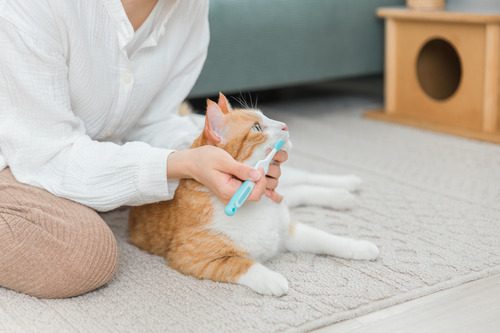Have you noticed that your cat’s breath has an unpleasant odor lately? While many pet owners think bad breath is just a part of having a cat, it can often signal an underlying issue that needs attention. From dental disease to more serious health conditions, foul-smelling breath can be a sign that something isn’t quite right with your feline friend. Addressing the source of bad breath not only improves their comfort but can also safeguard their long-term health. If your cat’s breath has you concerned, Lake City Animal Hospital is here to help. Call us at (386) 755-0236 or request an appointment online today to ensure your cat gets the care they need.

What Causes Bad Breath in Cats?
Bad breath, also known as halitosis, isn’t uncommon in cats, but it’s not something to ignore. Several factors contribute to this issue, ranging from minor concerns to more serious health conditions.
Dental Disease
The most common reason for bad breath in cats is dental disease, such as gingivitis or periodontal disease. Plaque buildup, tartar, and inflammation can harbor bacteria, creating a noticeable odor. Over time, untreated dental issues can lead to pain, tooth loss, or infection.
Diet and Eating Habits
Your cat’s food can also play a role in their breath. Wet food, strong-smelling ingredients, or even scavenging scraps can leave unpleasant odors in their mouth. Additionally, cats that eat too quickly or don’t chew properly might experience digestive issues contributing to bad breath.
Medical Conditions
Bad breath in cats isn’t always about dental health. Conditions like kidney disease, diabetes, or liver issues can result in distinctive breath odors. For example, a sweet or fruity smell might suggest diabetes, while a metallic or ammonia-like odor may indicate kidney concerns.
Foreign Objects
Cats are curious by nature and may chew on things they shouldn’t. Objects like string, bones, or even small toys can get stuck in their mouths, leading to bacterial growth and bad breath.
How to Identify the Cause of Your Cat’s Bad Breath
Determining the reason behind your cat’s bad breath often involves careful observation and a veterinary evaluation. There are specific signs to look for and steps you can take to pinpoint the issue.
Signs to Watch For
Beyond bad breath, keep an eye out for symptoms such as drooling, difficulty eating, pawing at the mouth, or visible swelling. These signs may indicate dental problems or oral discomfort that require attention.
Veterinary Examination
A professional veterinary examination is the best way to identify the root cause of bad breath. The veterinarian will assess your cat’s teeth, gums, and overall health, checking for dental disease, foreign objects, or signs of systemic illness.
Solutions for Bad Breath in Cats
Once the cause of your cat’s bad breath is identified, addressing the problem becomes much easier. Solutions can range from improving oral hygiene to managing medical conditions.
- Routine Dental Care: Regular dental care is essential for maintaining your cat’s oral health. Brushing your cat’s teeth with vet-approved toothpaste can reduce plaque buildup and improve breath. If brushing isn’t an option, dental chews and water additives can help keep their mouth cleaner between vet visits.
- Professional Dental Cleaning: If your cat’s bad breath is linked to significant dental disease, your veterinarian may recommend a professional dental cleaning. This process removes tartar and plaque buildup and addresses any underlying dental issues.
- Diet Adjustments: Switching to high-quality cat food that promotes oral health can make a difference. Certain kibble formulas are designed to reduce tartar buildup, while prescription diets may be recommended for specific medical needs.
- Treating Underlying Medical Conditions: If bad breath is a symptom of a more serious condition like kidney disease or diabetes, treating the underlying issue is key. Your veterinarian can develop a treatment plan to manage the illness and reduce associated symptoms, including bad breath.
How to Prevent Bad Breath in Cats
Taking proactive steps can help prevent bad breath from becoming a recurring problem. Establishing a routine for your cat’s oral and overall health can keep them happier and healthier.
Regular Veterinary Checkups
Routine wellness checkups with your veterinarian are essential. During these visits, your vet can spot early signs of dental disease or other conditions that may lead to bad breath.
Maintaining Oral Hygiene
Incorporating dental care into your cat’s routine can go a long way. Aim to brush their teeth a few times a week, or use alternatives like dental gels and toys designed for oral health.
Monitoring Diet and Behavior
Pay attention to your cat’s diet and eating habits. Avoid giving them human food or treats that could upset their stomach or stick to their teeth. If your cat tends to chew on objects, provide safe toys to satisfy their curiosity.
When Is It Time to Call Your Veterinarian?
While mild bad breath might resolve with better dental care, persistent or severe odor should never be ignored. If your cat’s bad breath is accompanied by other symptoms like vomiting, lethargy, or weight loss, contact your veterinarian promptly. These signs may point to a more serious health concern. Lake City Animal Hospital is here to help. Call (386) 755-0236 or request an appointment online to address your cat’s bad breath and ensure they receive the care they need.
Helping Your Cat Feel Their Best
Bad breath in cats can indicate more than just an inconvenience—it may highlight the need for improved dental care or attention to other health concerns. By staying proactive with routine veterinary visits and at-home care, you can support your cat’s well-being and enjoy their company without holding your breath. For personalized advice and care, reach out to Lake City Animal Hospital at (386) 755-0236 today.

